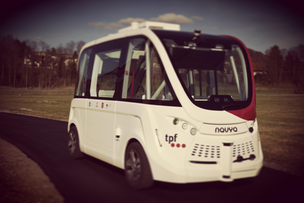The shuttles were designed by French company Navya with an operating platform developed by Swiss firm Bestmile (Marc Striffeler/tpf) - Click to enlarge The launch of two autonomous shuttle buses in Fribourg on Friday marks the first time in Switzerland that such vehicles have been inducted into the regular transport network. The “self-driving” electric minibuses link the Marly Innovation Center (MIC) in the suburbs to the Fribourg Public Transport (TPF) network. The 1.3 km journey takes seven minutes with four stops. The vehicles have an autonomy of eight hours and their maximum speed is limited to 25 km/h. Guided by GPS and radars they stop and honk if they spot an obstacle. Each of these vehicles is approximately
Topics:
SWI swissinfo.ch considers the following as important: Business, Featured, newslettersent, Swiss Markets and News
This could be interesting, too:
Nachrichten Ticker - www.finanzen.ch writes Die Performance der Kryptowährungen in KW 9: Das hat sich bei Bitcoin, Ether & Co. getan
Nachrichten Ticker - www.finanzen.ch writes Wer verbirgt sich hinter der Ethereum-Technologie?
Marc Chandler writes March 2025 Monthly
Mark Thornton writes Is Amazon a Union-Busting Leviathan?

The shuttles were designed by French company Navya with an operating platform developed by Swiss firm Bestmile (Marc Striffeler/tpf) - Click to enlarge
The launch of two autonomous shuttle buses in Fribourg on Friday marks the first time in Switzerland that such vehicles have been inducted into the regular transport network.
The “self-driving” electric minibuses link the Marly Innovation Center (MIC) in the suburbs to the Fribourg Public Transport (TPF) network. The 1.3 km journey takes seven minutes with four stops. The vehicles have an autonomy of eight hours and their maximum speed is limited to 25 km/h.
Guided by GPS and radars they stop and honk if they spot an obstacle. Each of these vehicles is approximately five meters long and two meters wide and can accommodate eleven passengers. An assistant is always present to assist people with reduced mobility, to ensure safety, and to switch to manual mode if necessary.
The aim of the vehicles is to offer a transport solution for the “last kilometre” especially in isolated areas where conventional alternatives are too expensive. The investment for the mini line added up to CHF700,000 ($722,209).
The service will run every seven minutes at peak hours, on demand the rest of the time, and on special request on weekends. Currently, the service is free but passengers will be charged from December 10, when the system will be officially integrated into the Fribourg public transport network.
There have been other autonomous vehicle projects in Switzerland like the ones in the city of Sion and the Swiss Federal Institute of Technology Lausanne (EPFLexternal link) but these have been pilots.
Tags: Business,Featured,newslettersent
